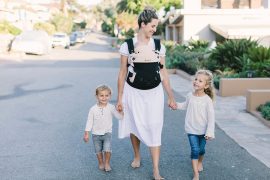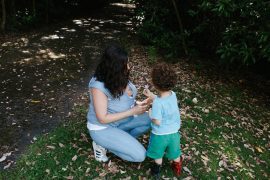By Dr Rosie Knowles
Carrying your baby is essential to their normal physical, psychological and neurological development. Human bodies are adapted to be a carrying species, it is part of our evolutionary history, however, our bodies are not as fit or as strong as our nomadic ancestors. It can be hard to carry in arms for prolonged periods of time. Nevertheless, babies need to be held, so a good, safe sling can be very useful in to help with increasing carrying frequency.
Remember, it is the relationship of closeness and loving touch that matters, as well as the position adopted in a good sling. The type of sling or the fabric that you use is just personal preference.
The positive effects of carrying for baby are many; here are a few:
- It encourages bonding with the parent and helps to meets baby’s strong need for a sense of security and attachment, which will lead to greater confidence and independence later in life, as well as resilience and better long term physical health.
- It helps to regulate temperature, heart and respiratory rates, and emotional and physical growth. This can be especially useful for premature babies (the term “kangaroo care” and “fourth trimester” come from this concept) or children who are unwell. You can read more about the huge advantages of such skin-to-skin care in those early days here.
- It promotes and encourages the establishment of a successful breastfeeding relationship. Mothers who carry their children in soft slings are more likely to breastfeed beyond the early weeks.
- Regular close skin contact is believed to help babies regulate their circadian rhythms better and distinguish the difference between night and day sleep.
- It reduces crying, both frequency and duration, and can improve sleep. It is safe for your baby to sleep in the sling, if the airway is well protected. Less crying means more time to be in “quiet absorption”, promoting learning and positive interactions with the world.
- Babies with colic can be hard to soothe, but the motion gained from being gently rocked in a sling while the parent walks often helps to settle them.
- A good sling that encourages an upright position can reduce posseting and reflux, and a spread squat postion helps relax puborectalis muscle, to aid bowel elimination.
See next page for more…











